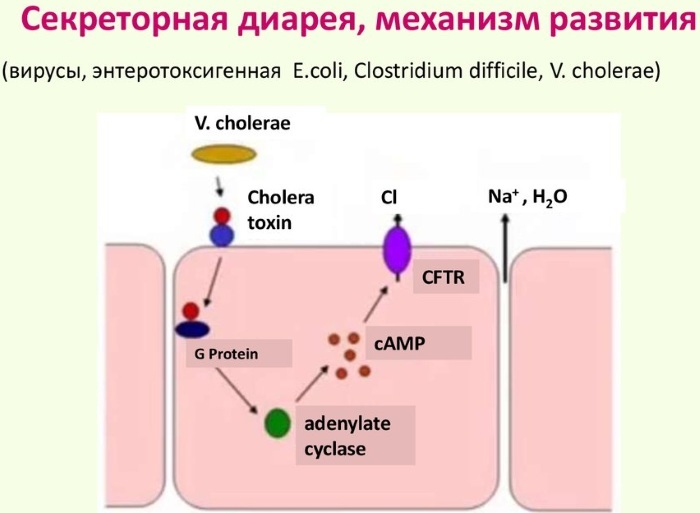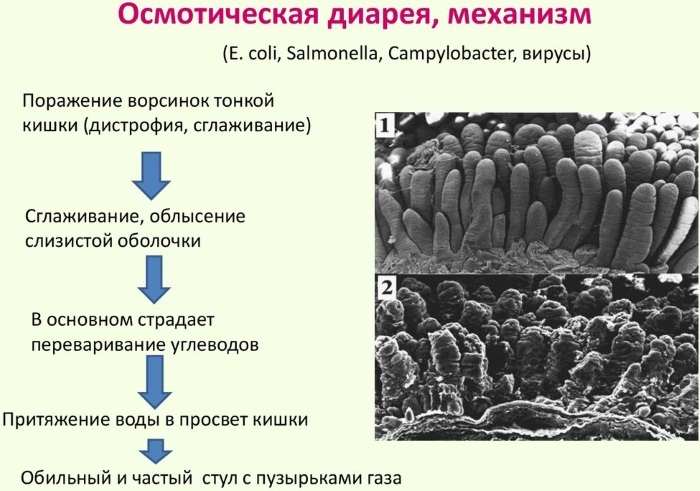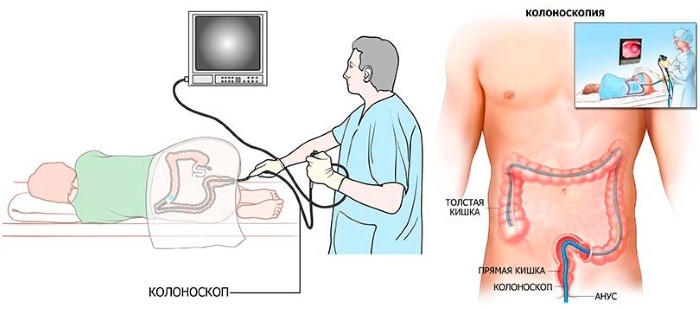In most cases, chronic diarrhea in adults is the cause of serious illness. Symptoms of a pathological condition accompany a person for a long period of time or appear periodically. It is necessary to undergo a comprehensive examination, visit a therapist and determine the provoking factor. In the absence of timely therapy, the patient will face unpleasant consequences.
Record content:
- 1 How does diarrhea become chronic?
- 2 Mechanism of occurrence
- 3 Causes of occurrence
- 4 Symptomatic manifestations
- 5 Classification and signs
- 6 Diagnostics
- 7 How is chronic diarrhea treated?
- 8 Diet and drinking regimen
- 9 Traditional medicine recipes
- 10 Diarrhea videos
How does diarrhea become chronic?
Diarrhea is not an independent pathological phenomenon. In most cases, diarrhea indicates a disorder in the human body. Many people try to eliminate the symptoms on their own and this aggravates the situation. Diarrhea becomes chronic, periodically occurs in humans. And at this stage, it is already a sign of a serious illness.
Chronic diarrhea must be treated strictly under medical supervision, especially for young children and the elderly. This is the category of people who are most at risk of facing serious complications of stool disorders, including dehydration.
Mechanism of occurrence
Stool disturbance occurs as a result of a failure of one of the many mechanisms in the intestines:
- Secretion.
- Osmotic pressure.
- Transit of intestinal contents.
- Exudation.
Pathological processes that arise in the human body negatively affect them, which leads to disorders. The secretion increases, the pressure in the intestinal cavity rises, the process of movement of its contents is disrupted. This is how diarrhea begins and the characteristic symptoms appear.
Causes of occurrence
Various provoking factors can cause stool disorder. Often people who travel are faced with impaired bowel movement. They don't know what kind of water they drink or eat exotic fruits, so diarrhea may appear.

But there are general reasons against which a person's stool is disturbed:
- non-compliance with sanitary standards;
- emotional shock, frustration, prolonged stress;
- drinking dirty water or food;
- an allergic reaction to treatment with certain drugs;
- the development of intestinal infection, which is provoked by viruses, bacteria, protozoa;
- individual sensitivity to active ingredients that are part of drugs or certain food products;
- hormonal disorders;
- intolerance to dairy products;
- indigestion (common after overeating or eating a large amount of food that is difficult to digest);
- food poisoning;
- the use of laxatives;
- abuse of products that contain sweeteners;
- intestinal inflammation;
- enzyme deficiency;
- poisoning of the body with chemical or toxic substances.
Oncological diseases of the intestine can provoke the development of chronic diarrhea in an adult. Many diseases of the gastrointestinal tract are accompanied by disturbed stools, since pathological processes affect the absorption of nutrients obtained with food.
Symptomatic manifestations
Chronic diarrhea in adults (the reasons will help to identify laboratory tests) is accompanied by a certain clinical picture, which will allow the doctor to determine the focus of pathological processes, prescribe the most informative examination and select a scheme therapy.

Disruption of the process of digestion and bowel movement is accompanied by the following symptoms:
- there is severe bloating;
- stool of liquid consistency;
- there are cramps and pain in the abdomen;
- the person is also worried about vomiting;
- fever appears;
- worried about periodic nausea;
- rumbling in the stomach is heard;
- the skin becomes dry;
- appetite worsens;
- the urine turns dark;
- a person feels a general weakness in the body;
- the patient is disturbed by the feeling of thirst.
In some situations, the stool contains mucus or blood impurities. It is necessary to establish an accurate diagnosis and select an effective treatment.
Classification and signs
Taking into account the mechanism of occurrence of chronic diarrhea, in medicine, the pathological condition is classified as follows:
| Name | Description |
| Secretory diarrhea | Diarrhea is accompanied by the secretion of a large amount of fluid and mucus. Secretory diarrhea often occurs against the background of tumor processes or intestinal inflammation.
|
| Osmotic diarrhea | A large amount of fluid accumulates in the intestines. The process of its absorption is also disrupted. A common cause of osmotic diarrhea is enzyme deficiency in the human body.
|
| Inflammatory diarrhea | Diarrhea occurs against the background of certain diseases that provoke the development of the inflammatory process in the area gastrointestinal tract (ulcerative colitis, irritable bowel syndrome, hyperthyroidism, cancer intestines). |
| Fatty diarrhea | Diarrhea results from a malfunctioning of the pancreas. The body secretes little or no pancreatic juice, which is necessary for fats to be absorbed in the intestines. The cause of the pathological condition is also pathogenic bacteria that have entered the intestines, ischemia and impaired liver function. |
Each type of chronic diarrhea is accompanied by characteristic clinical symptoms, with which it is recommended to go to the hospital, undergo examination and treatment.
Diagnostics
A comprehensive diagnosis will help determine the causes of chronic diarrhea in adults. Many diseases are accompanied by similar clinical symptoms, so it is important to differentiate.
Patients with chronic diarrhea are assigned the following testing methods:
| Name | Description |
| Rector-anoscopy | Bacteriological and microscopic analyzes of feces are performed. The results will help identify a bacterial infection or inflammation. |
| Endoscopic research | The intestines are examined. During medical procedures, a special tube and an endoscope are inserted through the patient's mouth. The doctor visually identifies pathological foci. |
| Irrigoscopy | A diagnostic method that is prescribed to patients if the attending physician suspects the development of tumor processes (polyposis, cancer). |
| Colonoscopy | During the procedure, a specialist assesses the physical condition of the intestinal walls. Identifies ulcers, evaluates their size and localization of the inflammatory focus.
|
| Retroma-noscopy | A diagnostic method by which the doctor identifies polyps or tumors in the intestinal area. |
| Biopsy | Medical manipulations are carried out during endoscopic examinations. The specialist takes the affected tissue for examination in the laboratory. |
| General analysis of blood and urine | Laboratory tests help determine the level of vitamins, iron, glucose, hormones and other blood parameters that change with the development of the inflammatory process in the human body. |
Considering the results obtained after the diagnosis, the patient may need additional consultation from others specialized specialists (allergist, oncologist, immunologist, gastroenterologist, endocrinologist, proctologist, nephrologist).
In some situations, in order to confirm the previously established diagnosis, the patient is prescribed instrumental examination methods (magnetic resonance imaging, radiography, computed tomography, ultrasound study).
How is chronic diarrhea treated?
Chronic diarrhea in adults (diagnostics will help determine the causes) is treated with complex methods. A specialized doctor, who individually draws up a therapy regimen, takes into account the results of the patient's examination, the symptoms present and the individual characteristics of the organism.
Prescribed drugs, in the absence of serious contraindications, you can use folk remedies. Additionally, the patient is given a special diet.
Drug therapy involves the use of the following drugs:
| Drug group | Name | Application |
| Sorbents | Activated carbon, Smecta | Medicines are taken orally before meals. Adult patients are prescribed 1-2 g 3-4 times a day. The course of treatment depends on the person's condition and lasts an average of 3-7 days. |
| Antidiarrheal drugs | Loperamide, Imodium | Medicines eliminate diarrhea and slow down intestinal motility. Adults with chronic diarrhea are prescribed 4 mg after each bowel movement. The drug is taken before stool normalization, in most cases it takes 2 days. |
| Intestinal anti-inflammatory drugs | Salofalk, Mesalazin | Medicines are prescribed for intestinal infections. The drugs reduce inflammation without being absorbed into the bloodstream. Antiseptics act in all parts of the intestine. Tablets are recommended to be taken 3 times a day 1 hour before meals, in the morning, at lunchtime and in the evening. The standard dosage is 500 mg. The course of treatment lasts 8-12 weeks. |
| Probiotics | Enterol, Linex | The preparations restore the beneficial intestinal microflora. The adult dosage is 1-2 sachets 1-2 times a day. The course of treatment depends on the person's condition and lasts from 3 to 14 days. |
| Phytopreparations | Kaopectat, Yarrow | Medicines reduce intestinal secretion, and also restore peristalsis. The preparations contain herbal ingredients that have an astringent effect. The medicine must be taken before meals, 2-3 tablets 3-4 times a day. |
| Enzymes | Mezim, Festal | Medicines are prescribed to patients if diarrhea is caused by diseases of the gastrointestinal tract. Patients need to take 1-3 tablets every day before meals. |
| Electrolyte solutions | Regidron, Chlosal | The drugs allow you to restore the water-salt balance, which occurs against the background of severe dehydration of the body. Patients are advised to drink 10 ml / kg every hour. Dilute the sachet in warm water (1 l). Take the medicine in small sips. |
| Anti-inflammatory drugs | Diclofenac, Sulfasalazine | The tablets should be taken orally, washed down with plenty of water, after meals. The initial dosage of the drug is 500 mg 4 times a day. It should be gradually increased to 2 g. The course of treatment lasts 6 months or more. |

Medication treatment is aimed at eliminating the cause of chronic diarrhea and restoring bowel function.
Diet and drinking regimen
Chronic diarrhea in adults (the causes of the pathological condition must be identified at an early stage in order to prevent possible complications) without fail requires the patient to comply with a special dietary nutrition. It is necessary to reduce the negative impact on the bowel function, remove dishes that irritate the mucous membrane from the diet.
| Allowed Products | Prohibited foods |
|
|


You should eat in small portions, but often so that the digestive system can slowly and carefully cope with its work. In such a situation, food will be better digested, the necessary substances will be absorbed and assimilated. It is also necessary to adhere to the drinking regime, drink enough clean liquid.
Traditional medicine recipes
Chronic diarrhea in adults (the causes of disturbed stool can be hidden in a serious illness) is also treated with recipes from healers and healers. But strictly after consultation with the attending physician and in complex therapy with other traditional means.
It is important to remember about the high likelihood of an allergic reaction or individual sensitivity. Self-therapy can aggravate health conditions and provoke unpleasant consequences.
Effective traditional medicine:
| Name | Recipe | Application |
| Nettles and blackberries | The leaves of the plant must be poured with boiling water. Insist for 2 hours and drain. | The resulting broth must be taken orally at 0.5 tbsp. 4 times a day. Nettle and blackberry have anti-inflammatory effects, increase the body's defenses and reduce inflammation. |
| Walnuts | Walnut partitions are poured with vodka and left for 3 days. | It is recommended to take the strained tincture 10 drops with a sufficient amount of water. |
| Herbal collection | Mix 4 tablespoons. immortelle, 2 tbsp. sage, 2 tablespoons St. John's wort and 1 tbsp. rhubarb root. Grind all components and pour 2 tbsp. herbal collection with boiling water (1 tbsp.). Put the resulting mass in a water bath and continue to heat for another 10 minutes. Insist 30 minutes in a dark place. | The finished herbal remedy is recommended to be taken orally until all signs of chronic diarrhea disappear. The adult dosage is 1/3 tbsp. 3 times a day. |
| Dill | The seeds of the plant must be crushed. Pour 0.5 tsp. the resulting powder with milk (1 tbsp.). Put the resulting mixture over medium heat, boil for 3 minutes and cool. | Take a decoction of dill 4 times a day, each time preparing a new drink. |
| Healing collection | Mix in equal proportions calendula, chamomile, blackberry leaves, plantain, calamus root. Add activated charcoal and cumin seeds. Pour 1 tbsp. collection with boiling water (1 tbsp.). Put the resulting mass in a water bath, heat for 15-20 minutes. Cool and drain. | The finished medicine should be taken in 1/3 tbsp. 3 times a day. |

Cherry compote will also help restore stool and eliminate diarrhea. A solution made from apple cider vinegar, lemon juice and potato starch has a healing effect. Folk remedies envelop and soothe the intestinal mucosa, reduce inflammation, and remove toxins from the human body. Normalize stool and eliminate accompanying symptoms.
A doctor can help determine the causes of chronic diarrhea in adults. Untimely medical attention or inappropriate therapy can lead to serious complications. Dehydration of the body negatively affects the functioning of the immune system. The same goes for the endocrine and digestive systems.
Diarrhea videos
Malysheva about diarrhea:



